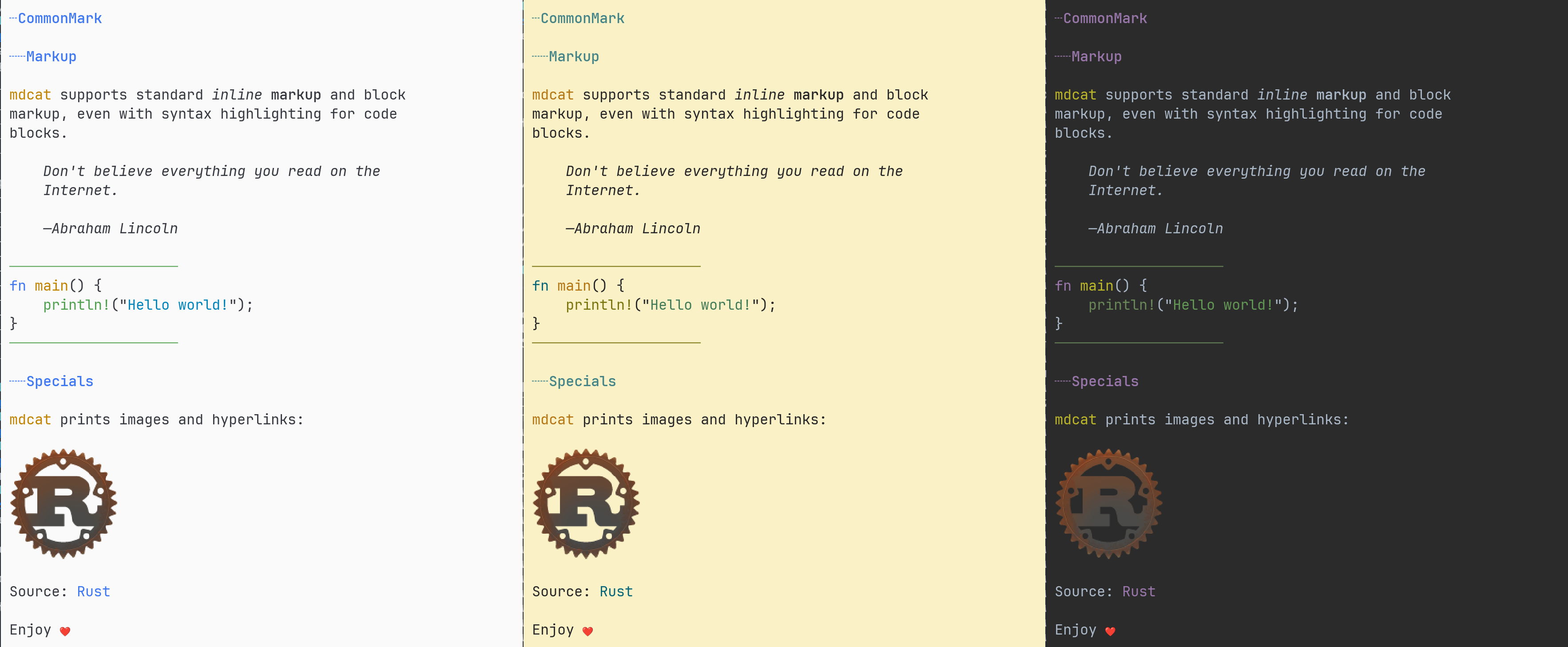Fancy cat for Markdown (that is, CommonMark):
$ mdcat sample.md
mdcat in WezTerm, with "One Light (base16)", "Gruvbox Light", and "Darcula (base16)" (from left to right), and JetBrains Mono as font.
mdcat works best with iTerm2, WezTerm, and kitty, and a good terminal font with italic characters.
Then it
- nicely renders all basic CommonMark syntax,
- highlights code blocks with syntect,
- shows links, and also images inline in supported terminals (see above, where "Rust" is a clickable link!),
- adds jump marks for headings in iTerm2 (jump forwards and backwards with ⇧⌘↓ and ⇧⌘↑).
| Terminal | Basic syntax | Syntax highlighting | Images | Jump marks |
|---|---|---|---|---|
| Basic ANSI¹ | ✓ | ✓ | ||
| Windows 10 console | ✓ | ✓ | ||
| Terminology | ✓ | ✓ | ✓ | |
| iTerm2 | ✓ | ✓ | ✓³ | ✓ |
| kitty | ✓ | ✓ | ✓³ | |
| WezTerm | ✓ | ✓ | ✓³ | |
| VSCode | ✓ | ✓ | ✓³ |
- mdcat requires that the terminal supports strikethrough formatting and inline links. It will not render strikethrough text and links correctly on terminals that don't support these (e.g. the Linux text console)
- VTE is Gnome’s terminal emulation library used by many popular terminal emulators on Linux, including Gnome Terminal, Xfce Terminal, Tilix, etc.
- SVG images are rendered with resvg, see SVG support.
Not supported:
- CommonMark extensions for footnotes and tables.
Try mdcat --help or read the mdcat(1) manpage.
- Release binaries built on Github Actions.
- 3rd party packages at Repology
- You can also build
mdcatmanually withcargo install mdcat(see below for details).
mdcat can be linked or copied to mdless; if invoked as mdless it automatically uses pagination.
Run cargo build --release.
The resulting mdcat executable links against the system's SSL library, i.e. openssl on Linux.
To build a self-contained executable use cargo build --features=static; the resulting executable uses a pure Rust SSL implementation.
It still uses the system's CA roots however.
When packaging mdcat you may wish to include the following additional artifacts:
-
A symlink or hardlink from
mdlesstomdcat(see above). -
Shell completions for relevant shells, by invoking
mdcat --completionsafter building, e.g.$ mdcat --completions fish > /usr/share/fish/vendor_completions.d/mdcat.fish $ mdcat --completions bash > /usr/share/bash-completion/completions/mdcat $ mdcat --completions zsh > /usr/share/zsh/site-functions/_mdcat # Same for mdless if you include it $ mdless --completions fish > /usr/share/fish/vendor_completions.d/mdless.fish $ mdless --completions bash > /usr/share/bash-completion/completions/mdless $ mdless --completions zsh > /usr/share/zsh/site-functions/_mdless
-
A build of the man page
mdcat.1.adoc, using AsciiDoctor:$ asciidoctor -b manpage -a reproducible -o /usr/share/man/man1/mdcat.1 mdcat.1.adoc $ gzip /usr/share/man/man1/mdcat.1 # If you include a mdless as above, you may also want to support man mdless $ ln -s mdcat.1.gz /usr/share/man/man1/mdless.1.gz
mdcat can output extensive tracing information when asked to.
Run mdcat with $MDCAT_LOG=trace for complete tracing information, or with $MDCAT_LOG=mdcat::render=trace to trace only rendering.
Copyright Sebastian Wiesner [email protected]
Binaries are subject to the terms of the Mozilla Public License, v. 2.0, see LICENSE.
Most of the source is subject to the terms of the Mozilla Public License, v. 2.0, see LICENSE, unless otherwise noted; some files are subject to the terms of the Apache 2.0 license, see http:https://www.apache.org/licenses/LICENSE-2.0
